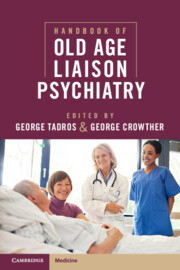Book contents
- Handbook of Old Age Liaison Psychiatry
- Handbook of Old Age Liaison Psychiatry
- Copyright page
- Contents
- Contributors
- Introduction
- Chapter 1 Psychological Well-Being in Later Life
- Chapter 2 The Epidemiology of Mental Illness in Older People in Acute Hospitals
- Chapter 3 Elderly-Friendly Care Settings and Hospitals
- Chapter 4 Communication with Older People
- Chapter 5 Privacy and Dignity in Acute Hospitals
- Chapter 6 Liaison Psychiatry and Law
- Chapter 7 Safeguarding Adults
- Chapter 8 Carers’ Needs before, during, and after Hospital Admissions
- Chapter 9 Dementia and Related Disorders
- Chapter 10 Behavioural and Psychological Symptoms of Dementia in Hospital Settings
- Chapter 11 Liaison Old Age Psychiatry Management of Delirium in Acute Hospitals
- Chapter 12 Depression and Associated Disorders
- Chapter 13 Prevention of Suicide and Self-Harm in Older People
- Chapter 14 Fear and Anxiety in Acute Settings
- Chapter 15 Late-Onset Psychosis and Related Disorders
- Chapter 16 Drug and Alcohol Misuse in Older People
- Chapter 17 Perioperative Medical Management of Older People
- Chapter 18 Parkinson’s Disease and Related Disorders in Acute Hospitals
- Chapter 19 Comprehensive Geriatric Assessment in Clinical Practice
- Chapter 20 Interface between Liaison Psychiatry Services for Older People and Wider Community Services
- Chapter 21 Psychometric Measures in Old Age Psychiatry
- Index
- References
Chapter 2 - The Epidemiology of Mental Illness in Older People in Acute Hospitals
A Growing Challenge for the Liaison Psychiatrist
Published online by Cambridge University Press: 04 April 2024
- Handbook of Old Age Liaison Psychiatry
- Handbook of Old Age Liaison Psychiatry
- Copyright page
- Contents
- Contributors
- Introduction
- Chapter 1 Psychological Well-Being in Later Life
- Chapter 2 The Epidemiology of Mental Illness in Older People in Acute Hospitals
- Chapter 3 Elderly-Friendly Care Settings and Hospitals
- Chapter 4 Communication with Older People
- Chapter 5 Privacy and Dignity in Acute Hospitals
- Chapter 6 Liaison Psychiatry and Law
- Chapter 7 Safeguarding Adults
- Chapter 8 Carers’ Needs before, during, and after Hospital Admissions
- Chapter 9 Dementia and Related Disorders
- Chapter 10 Behavioural and Psychological Symptoms of Dementia in Hospital Settings
- Chapter 11 Liaison Old Age Psychiatry Management of Delirium in Acute Hospitals
- Chapter 12 Depression and Associated Disorders
- Chapter 13 Prevention of Suicide and Self-Harm in Older People
- Chapter 14 Fear and Anxiety in Acute Settings
- Chapter 15 Late-Onset Psychosis and Related Disorders
- Chapter 16 Drug and Alcohol Misuse in Older People
- Chapter 17 Perioperative Medical Management of Older People
- Chapter 18 Parkinson’s Disease and Related Disorders in Acute Hospitals
- Chapter 19 Comprehensive Geriatric Assessment in Clinical Practice
- Chapter 20 Interface between Liaison Psychiatry Services for Older People and Wider Community Services
- Chapter 21 Psychometric Measures in Old Age Psychiatry
- Index
- References
Summary
Epidemiology studies how regularly diseases occur in different groups of people and why – hence its pivotal role in planning the distribution of resources. This chapter focuses on the epidemiology of mental illnesses in older people in acute hospitals and highlights the role of the liaison psychiatrist and other mental health professionals in bridging the gap between physical and mental disorders. By outlining the intricate connection between the two, it explains why careful consideration and a high index of suspicion are needed when assessing older persons in the acute hospital. Emphasis is placed on the importance of viewing ageing as a normal biological and social construct rather than a problematic disease process to which a figurative cut-off point can be applied. The chapter gives prominence to the mammoth social and economic burden of mental disorders, borne by all in society.
The chapter has subsections on important epidemiological terminologies, life expectancy, the prevalence of common psychiatric disorders in acute general hospitals (including emergency departments), and the influence of COVID-19 on the prevalence of mental disorders in older persons. It sounds a clarion call to challenge current practice, work synergistically with all stakeholders, and embrace change if a crisis is to be averted.
Keywords
- Type
- Chapter
- Information
- Handbook of Old Age Liaison Psychiatry , pp. 24 - 37Publisher: Cambridge University PressPrint publication year: 2024

